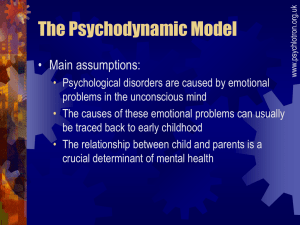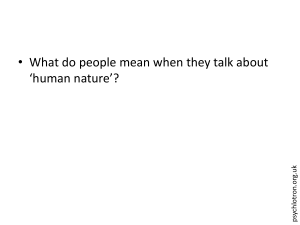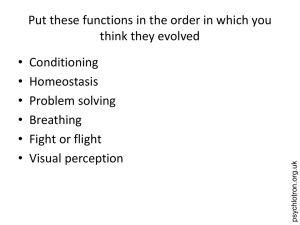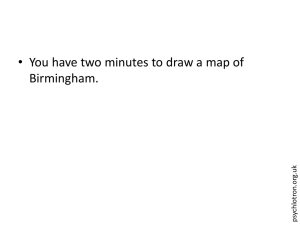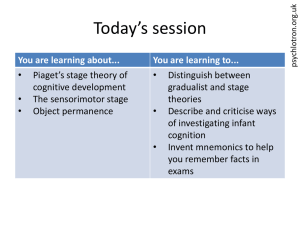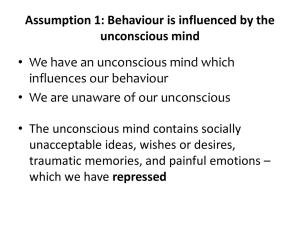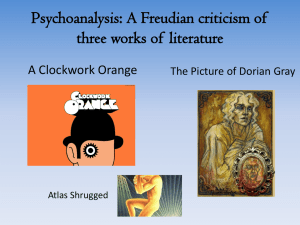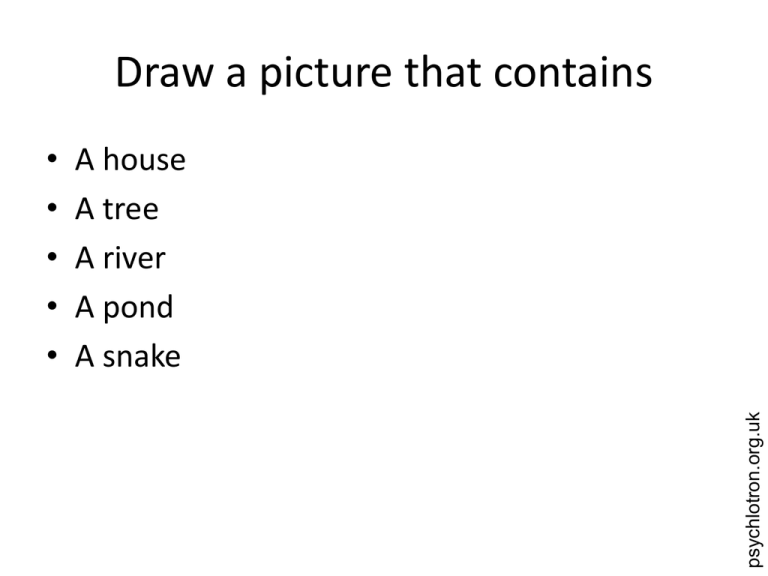
Draw a picture that contains
A house
A tree
A river
A pond
A snake
psychlotron.org.uk
•
•
•
•
•
Today you will…
Learn how to
• Use theoretical concepts to
explain behaviours
• Discuss the validity of
psychological theories
psychlotron.org.uk
Learn about
• The assumptions of the
psychodynamic approach
• Features of the unconscious
mind
We are learning about
•The psychodynamic approach
•Anxiety disorders
psychlotron.org.uk
We are learning how to...
•Apply psychological ideas
•Analyse behaviour in terms of
latent motives
• We are animals, driven by basic
biological motives
• The emergence of society
required us to bring our animal
impulses under control
• Psychology involves
understanding how our instincts
are channeled to produce civilised
behaviour – and what can go
wrong with this process.
psychlotron.org.uk
Sigmund Freud
Assumptions of psychodynamic approach
psychlotron.org.uk
• All behaviour is driven by unconscious thought
processes
• These thoughts can be manifested in different
ways
• Our experience as children affects how we
develop as adults
What your picture says about you
House = representation of yourself
Pond = your mind
Tree = your relationship with the opposite sex
River = relationship with your mother
Snake = your libido (sex drive)
psychlotron.org.uk
•
•
•
•
•
The Unconscious
The conscious. The small
amount of mental activity we
know about.
Thoughts
Perceptions
The preconscious. Things
we could be aware of if we
wanted or tried.
Bad
Worse
Really Bad
Fears
Unacceptable sexual desires
Violent motives
Irrational wishes
Immoral urges
Selfish needs
Shameful experiences
Traumatic experiences
psychlotron.org.uk
The unconscious. Things
we are unaware of and can
not become aware of.
Memories
Stored knowledge
The Psyche (Personality)
I
WILL
I
SHOULD
Id:
Ego:
Superego:
Instincts
Reality
Morality
psychlotron.org.uk
I
WANT
• You need to assign yourselves the roles of Id,
Ego and Superego – together you represent a
person’s psyche
• Each of you needs to think about your own
role, and how you influence personality
• Discuss how your personality would be
different depending on whether Id, Ego or
Superego was ‘in charge’
psychlotron.org.uk
In groups of 3
How would each respond if…
• Your mum has baked a cake and left it on the
kitchen table
• You’ve just met your best friend’s boyfriend
and really fancy him
psychlotron.org.uk
• You work in a shop – someone has overpaid
you and apparently not noticed
Healthy Psyche
OK Guys – I’m in charge.
Anything you want has to go
through me.
OK.
Ego
Id
Superego
psychlotron.org.uk
OK.
Psychotic
Sex! Food! Drink! Drugs!
NOW!
Id
Ego
Superego
psychlotron.org.uk
Who
turned out
the lights?
Neurotic
Listen up! I’m in charge, and you are not
here to enjoy yourselves. Get ready for a
double-size portion of anxiety with a side
order of guilt!
No fun.
Superego
Id
Ego
psychlotron.org.uk
>whimper<
Motives
• We have two sets of motives:
• Ego defence mechanisms turn latent motives
into manifest ones
psychlotron.org.uk
– Latent motives – the unconscious forces that
drive our behaviour
– Manifest motives – the lies we tell ourselves to
protect us from the truth
Ego defence mechanisms
Displacement
Sublimation
Behaving in ways
directly opposite to
unconscious
impulses, feelings.
Transferring
impulses and
feelings to an
originally neutral or
innocent target.
Manifestly liking your
boss when really you
hate them.
Redirection of
threatening impulses
to something socially
acceptable
Playing football
instead of punching
your boss (the activity
changes).
Kicking the cat instead
of kicking your boss
(the target changes).
psychlotron.org.uk
Reaction
formation
Phobia
• Unconscious fears are too
unpleasant for the
conscious mind to deal with
• These are displaced onto a
different target which
presents a less threatening
problem
• The phobic stimulus is not
the real cause of anxiety
OCD
• The id generates
unacceptable aggressive or
sexual impulses.
• The ego disguises their true
nature.
• The superego reacts to
them with guilt and anxiety
• The ego causes compulsive
behaviours to compensate.
psychlotron.org.uk
Explaining anxiety disorders
Homework
• Analyse the example case studies and suggest
– What the underlying cause of the anxiety might be
– How ego defence mechanisms have resulted in
the manifest behaviours
– Everything is a product of the unconscious
– Ego defence mechanisms can (in theory) produce
a very wide range of behaviours
psychlotron.org.uk
• Don’t forget these important points:

